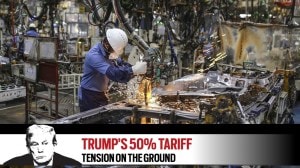From village roots to global innovation
In the modest village of Sardhana, Meerut, Verma grew up amidst the rhythms of rural life. His father, a sugarcane processing technologist, was among the first in the family to step away from farming.
 Vivek Verma
Vivek VermaFrom a village school in Sardhana to leading a global green-innovation enterprise in Chandigarh, Vivek Verma’s story embodies resilience, innovation, and the strength of family support.
A rural childhood
In the modest village of Sardhana, Meerut, Verma grew up amidst the rhythms of rural life. His father, a sugarcane processing technologist, was among the first in the family to step away from farming.
“Despite the challenges of rural India, my parents made education non-negotiable,” Verma says, recalling his days at the Baghpat cooperative sugar factory school. Frequent transfers as his father’s career advanced took the family across Uttar Pradesh and Haryana. “Those constant moves broadened my horizons. They also taught me how to connect with new people quickly, something that helped me later as an entrepreneur.”
A degree cut short
Verma’s academic journey took him to the prestigious GB Pant University of Agriculture and Technology, Pantnagar, where he studied agricultural engineering. But in 1992, a deep financial crisis upended his plans.
“I had completed nearly 90 per cent of my engineering degree,” Verma recollects. “But my father’s business setbacks forced me to step in. I had to choose responsibility over a degree.”
Birth of an enterprise
Spray Engineering Devices Limited (SEDL) was born from that leap. “We started as a tiny roadside fabrication unit,” Verma says. “Slowly, we grew into a proper workshop in Chandigarh’s Industrial Area and later expanded to Baddi. Our early focus was on engineering services and cooling systems for the sugar industry.”
Family support
In 1996, he married Mamta, a Shri Ram College of Commerce topper. Her unwavering support, he says, became his anchor. “She created stability at home so I could focus on business. Later, after my parents passed away, she joined me full-time in SEDL. Without her, this journey would have been far tougher.”
Their children, he adds, have carried forward this legacy of discipline and ambition. “Both studied in the United States, and in 2021, my elder son Vimarsh, after completing his master’s in mechanical engineering at the University of California, joined me in the business. It was a proud moment, watching him bring global knowledge back home.”
The challenges
Between 2008 and 2012, SEDL faced turbulent times. Finances were strained and several senior employees walked out.
“The most challenging period was when our senior employees left,” Verma recollects. “But in hindsight, it was a blessing. Our salary bill dropped by 33 per cent, and the young and mid-level team members who stayed with me stepped up. They took ownership, they led, and together we rebuilt SEDL. That crisis toughened us.”
The mission
By 2014, Verma gave SEDL a sharper direction: “We dedicated ourselves to sustainable environment development, unlocking perpetual food and energy resources.”
That pivot placed the company on the global map. “Our biggest breakthrough has been the world’s first boiler-less sugarcane processing technology,” Verma says. “It has the potential to create a $500 billion green hydrocarbon industry, built entirely on rural, renewable resources.”
SEDL’s integrated agro-industrial platform now processes over 1,80,000 tons of cane annually, saving nearly 60,000 tons of bagasse.
Global acclaim
In 2025, SEDL presented its biomass-based energy solutions at RegaTec in Weimar, Germany, drawing global attention. “Standing on that stage and sharing our vision with the world was an incredible moment,” Verma says.
Back home, the company received the Industry Excellence Award 2024 for outstanding contributions to energy efficiency in the sugar sector.
The vision
For Verma, the journey has never been only about profit. “Great companies are built on great ideas that serve society’s welfare,” he says. His long-term goals include eliminating fossil fuel dependence, ensuring 100 per cent water recycling, and restoring rivers to carry only rainwater-quality streams.
“Business is just a vehicle,” he reflects. “The real destination is a sustainable future.”







